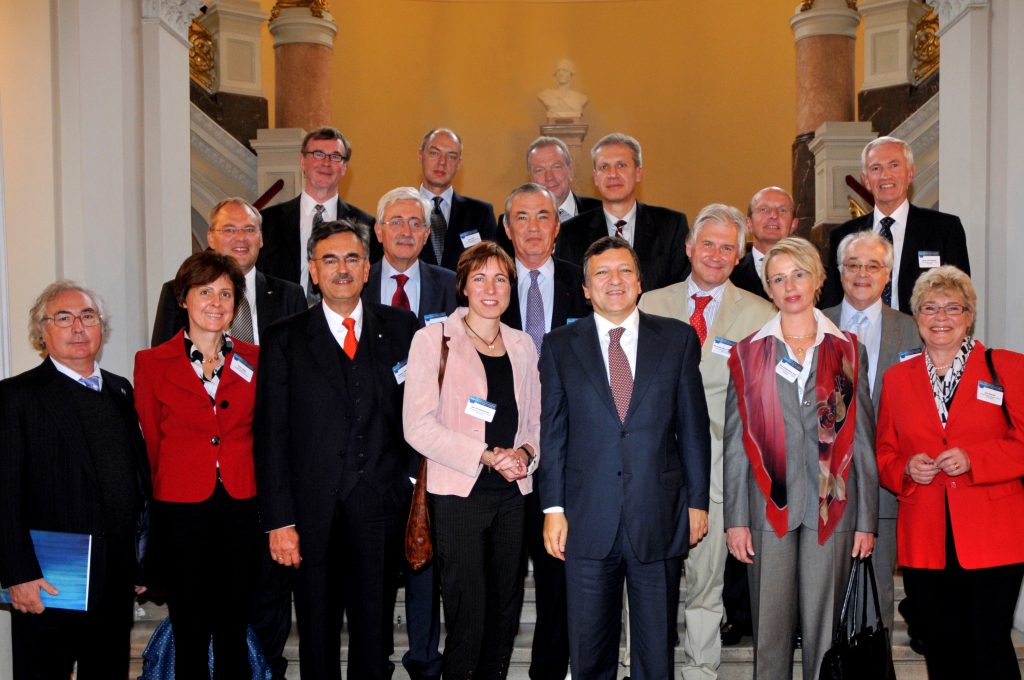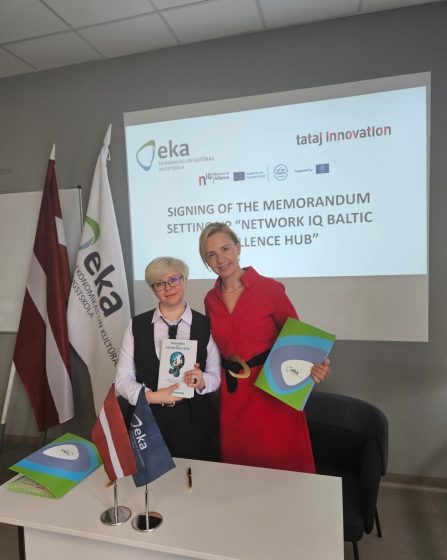Network IQ Alliance: developing networking competencies for innovation and entrepreneurship

Join us as we delve into the innovative world of Daria Gołębiowska-Tataj, the visionary behind the Network IQ Alliance. In this exclusive interview, Daria shares insights into the genesis of the project, its overarching objectives, and the remarkable achievements attained to date. From forging global partnerships to fostering entrepreneurial skills, discover how the Network IQ Alliance is shaping the future of innovation and entrepreneurship across borders.
Could you please introduce yourself and your role in Network IQ Alliance?
I’m an Honorary Professor at the Alliance Manchester Business School (AMBS) and the founder of Tataj Innovation, a company focusing on research and development in social sciences. Additionally, I serve as the Principal Investigator of the team that developed the Network Intelligence methodology which was originally designed for the EIT Alumni after my company sponsored the EIT Startup Days in Barcelona back in 2018.
After my tenure at the founding Governing Board of the European Institute of Innovation and Technology (EIT) since 2008, I established Tataj Innovation. Since 2014, my focus has been on leveraging the knowledge gained from my time with President Barroso and my EIT Board colleagues to drive innovation and foster entrepreneurship in Europe.

Currently, I’m also engaged in efforts to reunite the innovation ecosystems of the EU and the UK. The University of Manchester, with its 200-year history and industry commitment, embraced the research on Network Intelligence, as networking is one of the core values of our Masood Entrepreneurship Centre within AMBS. Recognising the need to accelerate innovation in the digital age, initiatives like the £1.5-billion Manchester Innovation District underscore our dedication to fostering local innovation ecosystems, where Network IQ skills are vital for the success of budding entrepreneurs – many of whom join our University from around the globe.
Between 2020 and 2022, we validated the Network Intelligence Academy educational offering in the UK through training programmes funded by Innovate UK and the EIT HEI Initiative. Alongside colleagues from the Masood Entrepreneurship Centre, we authored the proposal, formed the consortium, and successfully secured funding as the Network IQ Alliance in 2022.
For those who are unfamiliar with Network IQ Alliance, what is the project about?
Network IQ Alliance brings together entrepreneurial universities from Spain, Poland, Latvia, Ireland, and Australia, alongside my innovative company, a network of research institutes, an industry network, and a global network of science and technology parks spanning 77 countries. The project focuses on mainstreaming Network Intelligence, a system-change methodology aimed at developing networking competencies for innovation and entrepreneurship. Our objective is to boost Network IQ skills, empowering purpose-driven individuals to leverage their networks more effectively. This enables them to seize global business opportunities through sales and fundraising or drive social impact transformations, aligning with the sustainability interests of many of our alumni.
How did the idea for this project come about?
The genesis of this project stems from our validation of the Network Intelligence methodology with EntreUnity, a consortium funded by the EIT HEI Initiative. The outcomes were impressive, with significant capital raised, the establishment of complex partnerships, and increased sales across four continents. Notably, participants experienced a substantial boost in entrepreneurial self-confidence, overcoming the imposter syndrome often encountered by budding entrepreneurs and early-career researchers transitioning from the lab to the business world. By showcasing the efficacy of ‘strong ties’, we propelled many of them towards future success.
What was the added value/support of the EIT HEI Initiative for this project?
We are immensely grateful for receiving €1.2 million in funding over 24 months from the EIT HEI Initiative. The EIT’s emphasis on integrating the Knowledge Triangle among education, research, and innovation aligns perfectly with the objectives of our partners. In today’s increasingly hybrid or fully digital workplaces, methodologies like Network IQ, which facilitate collaboration within the Knowledge Triangle, are indispensable. Skilling and reskilling, especially in deep tech and knowledge-intensive sectors, are vital for economic and social growth, particularly for countries such as Poland. Additionally, we aim to collaborate with regional initiatives, as the Network Intelligence methodology is now part of the European Commission’s Partnerships for Regional Innovation. Fostering stronger connections between the EIT Knowledge and Innovation Community (KIC) model and regional innovation policies is crucial, especially for regions like Central and Eastern Europe facing innovation capacity challenges and brain drain. We take pride in the fact that Purpose-Network Fit, one of our core frameworks, is now part of the official toolbox published by the EC Joint Research Centre, featuring the KIC EIT Health, an early adopter of Network Intelligence.
What are some of Network IQ Alliance’s major achievements to date?
Over the past two years, we’ve conducted the Network IQ Train-the-Trainer programme for academic educators and business coaches. I’ve trained nearly 100 candidates, half of whom hold PhDs. Some are rectors or vice-rectors of our partner universities, all deeply committed to supporting their students or start-ups. Our achievements include adding Network Intelligence models to teaching different subjects such as entrepreneurship, management, marketing. Our partners institutionalised innovation and networking as university strategies. Some dived deeply into building international research consortia or forging industry partnerships. All these efforts have enhanced student employability and accelerated budding entrepreneurs’ client and investor acquisition. Currently, we’re compiling case studies to showcase our achievements.

You’ve recently established the Network IQ Excellence Hub in the Baltic region. Could you tell us a bit more about the Excellence Hub’s aims?
As part of our commitment, we aim to establish five Network IQ Excellence Hubs. The Baltic Hub, initiated by EKA University of Applied Sciences in Latvia and Tataj Innovation is the first of its kind globally. It will be joined by our current Polish partners – Łódz Medical University, Poznan University of Technology, Łukasiewicz, and Institute of Urban and Regional Development. Other universities and companies have also expressed interest in joining the Hub. These Hubs aim to foster networking competencies and build new partnerships for regional innovation. As I explained in my book ‘Innovation and Entrepreneurship: A Growth Model for Europe Beyond the Crisis’, networking models of innovation are key for driving Europe’s competitiveness, especially now given current EU policy priorities like open strategic autonomy, economic safety and security, and social resilience.
Where else are you looking to establish Excellence Hubs?
We’re currently working on establishing a Hub in the Iberia region, led by La Salle and RMIT Barcelona Campus, which will be linked to Latin America and Australia. Additionally, we’re exploring a Hub connecting the UK and Ireland, led by the University of Manchester and South East Technological University. We also anticipate a Network IQ Hub in Ukraine through our partner Ukrainian Catholic University. Finally, we aspire to establish a global Network IQ Hub with the International Association of Science Parks, aiming for five Hubs by the project’s end.
What were the biggest challenges that you faced and how did you overcome them?
One of our key challenges is fostering stronger connections with the broader EIT ecosystem, including other consortia within the EIT HEI Initiative and the EIT KICs. We’ve invested in building robust relationships with KICs like EIT Health, EIT Manufacturing, EIT Digital, and EIT Climate, as well as with EntreUnity and EuroSpaceHub. From its recent launch, we are also closely linked to the EIT UK Hub. We hope to see interest from these entities in getting trained as Network IQ Coaches, use our Network IQ toolbox to train their students and integrate our approach into their acceleration programmes.
What are the next steps for Network IQ Alliance?
We’ll continue our collaboration, recognising Network Intelligence as a quintessentially European methodology, aligning with the values and ideals that underpin the EIT and its alumni. No doubt, Network IQ skills have become indispensable in the post-COVID-19 workplace, making high Network IQ a must-have competence across organisations, big and small. It’s noteworthy that Network Intelligence embodies the core values and ideas of the EIT, as it was pioneered with the dedicated and relentless support of members of the founding EIT Governing Board who have formed the Advisory Board at Tataj Innovation. While I’m the inventor of Network Intelligence, its success is indebted to the support and collaboration of esteemed colleagues like Professors Manuel Castells, Julia King, Karen Maex, Linnar Viik, late Bertrand Collomb, and Martin Schuurmans, the founding Chair of the EIT. I would also like to take this opportunity to express my sincere gratitude to all the fantastic colleagues at both EntreUnity and Network IQ Alliance consortia, and foremost to my wonderful support network at the University of Manchester – Vice President Professor Luke Georghiou, Masood Entrepreneurship Centre Directors Lynn Sheppard and Tony Walker, now working as a North UK Lead at Innovate UK ICURe Programme, who have been one of the earliest believers in the value of Network Intelligence.
Visit the Network IQ Alliance website to learn more about the project’s activities.
Share your experience with the EIT HEI Initiative and inspire higher education institutions across Europe to boost their innovation and entrepreneurship capacity.
Published on: 27 May 2024